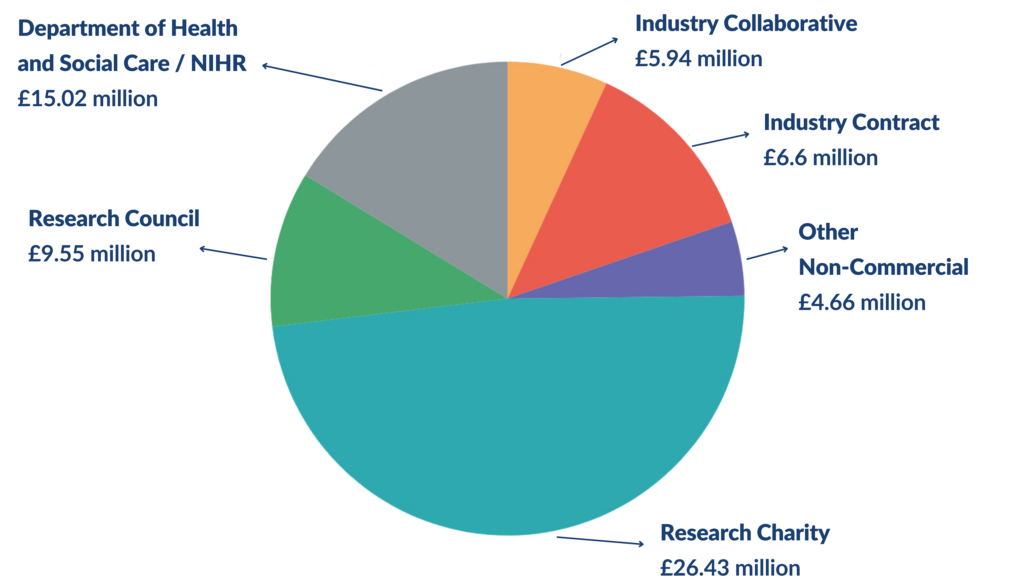Embed, Build, Accelerate – Manchester BRC Director’s blog – November 2024
Hello and a very warm welcome to my latest Embed, Build, Accelerate blog as the Director of the National Institute for Health and Care Research (NIHR) Manchester Biomedical Research Centre (BRC).
Through Embed, Build, Accelerate I will be celebrating a different aspect of Manchester BRC each edition and this time it’s our additional funding awards that we have leveraged in our second year.
As reported in our latest Annual Report submitted to NIHR, across our research Themes and Clusters we leveraged an incredible external income for 2023/24 of £68.2 million which I think is really something impressive to celebrate. You can read more about our Impact here.
This figure is a real reflection of the quality and breadth of research expertise we can demonstrate across our BRC, a key marker of our success and a metric that we can measure and build on each year. Thank you to everyone for your valued contribution.

Last month, The University of Manchester (UoM) launched their British Heart Foundation (BHF) Centre for Research Excellence. BHF previously awarded £4 million to support world-class cardiovascular disease research which was match funded by UoM, taking the total investment to £8 million. Prof Keavney, our Integrative Cardiovascular Medicine Co-Theme Lead will lead the Centre, along with Co-Theme Lead, Professor Maciej Tomaszewski.
Researchers from our Rheumatic and Musculoskeletal Diseases Theme were successfully awarded a Health Technology Assessment grant for £1.8 million to identify the most effective and safest way of using steroids for patients with uncontrolled Rheumatoid Arthritis who are starting an anti-rheumatic medicine.
Researchers in our Next Generation Phenotyping and Diagnostics Theme were awarded almost £350,000 from the Medical Research Council (MRC) as part of an ‘Infrastructure Fund’ to host an ‘Oxford Nanopore PromethION’ at UoM.
The ONT PromethION is a high-throughput, direct, real-time, single molecule sequencer which works by moving molecules through a small channel (or nanopore) and measuring changes in electrical energy as it does so. This new approach has many advantages, including an ability to generate data in large pieces and to go beyond identifying just the specific sequence of letters in our DNA. These advantages will enable new types of research which are addressing important areas of human health, including the study of diseases where genetics is a key driver.
The UK Rare Disease Research Platform was established with investment over 5 years by the MRC and the NIHR, with 3 of the 11 specialist nodes led by Rare Conditions researchers who each received a grant of around £1.3 million as part of this investment:
- Professor Bill Newman, leads the Rare Early Onset Lower Urinary Tract (REOLUT) study, aiming to find the causes, understand the biological basis, and develop treatments for patients affected by bladder disorders.
- Professor Siddharth Banka, co-leads the EpiGenRare node looking to establish a multidisciplinary network of clinicians, researchers and patient support groups to coordinate cutting-edge research to understand, diagnose and treat rare disorders.
- Dr Ramona Moldovan, leads the ELSI (Ethical, Legal and Social Issues) node working with colleagues in Manchester, Oxford and Cardiff, to accelerate research in ELSI cross-cutting issues ranging from the impact of rare conditions to the design of clinical trials for treatments.
Manchester researchers were also awarded £2 million as part of the NHS England plan to develop 8 ‘Genomic Networks of Excellence’ designed to be partnerships between the NHS, academia, the third sector and industry to leverage expertise and resources from the broader genomics ecosystem.
Colleagues from our Mental Health Theme hold significant roles within the Mental Health Mission – which received £10 million funding to accelerate our research; they play a key role by leading on 3 out of the 5 national themes: Dr Shruti Garg (Capacity Building), Professor Jonathan Green (Children and Young People), and Professor John Ainsworth (Data and Digital).
A £730,000 5-year NIHR Rosetrees Trust Advanced Fellowship was awarded to Dr Natalie Cook from our Cancer Precision Medicine Theme for a programme of research into cancer of unknown primary (CUP). The award will allow Dr Cook to trial blood-based genomic testing in patients diagnosed with CUP, which is where cancer has been found in the body, but current standard tests can’t identify where the cancer started.
These awards, and the many others received by our BRC colleagues, show our success in bringing together various areas of our infrastructure to support our different applications, the strengths of our partnerships and collaborations. It is fantastic to see that by working together we can achieve these substantial awards and our BRC provides the infrastructure to allow us to do that more easily.
This also demonstrates a very strong research foundation and something for us to build on going forwards, to ensure we continue to deliver high quality translational research which brings real impact and benefit.
The mission of the NIHR is to improve the health and wealth of the nation through research. This shows how we’re leveraging funding and how that funding can support our vast teams to deliver research which can save, change and improve lives.
For our latest news and successes, please ensure you are following Manchester BRC’s social media channels on X/Twitter and LinkedIn and keep up to date with the latest information, events and funding opportunities via the Manchester BRC website here.
Thank you
Professor Anne Barton
Director of the NIHR Manchester Biomedical Research Centre
